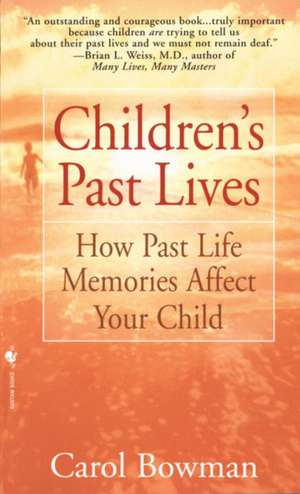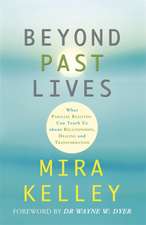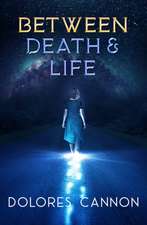Children's Past Lives: How Past Life Memories Affect Your Child
Autor Carol Bowmanen Limba Engleză Paperback – 31 dec 1997
In this fascinating, controversial, and groundbreaking book, Carol Bowman reveals overwhelming evidence of past life memories in children. Not only are such experiences real, they are far more common than most people realize.
Bowman's extraordinary investigation was sparked when her young son, Chase, described his own past-life death on a Civil War battlefield--an account so accurate it was authenticated by an expert historian. Even more astonishing, Chase's chronic eczema and phobia of loud noises completely disappeared after he had the memory.
Inspired by Chase's dramatic healing, Bowman compiled dozens of cases and wrote this comprehensive study to explain how very young children remember their past lives, spontaneously and naturally. In Children's Past Lives, she tells how to distinguish between a true past life memory and a fantasy, offers practical advice to parents on how to respond to a past life memory, and shows how to foster the spiritual and healing benefits of these experiences.
Perhaps the most moving, convincing, and best-documented evidence yet for life after death, Children's Past Lives will stand alongside the classics of Betty J. Eadie, Raymond Moody, and Brian Weiss in its power to comfort, uplift, and transform our thinking about life after death
Preț: 48.66 lei
Nou
Puncte Express: 73
Preț estimativ în valută:
9.31€ • 10.15$ • 7.85£
9.31€ • 10.15$ • 7.85£
Carte disponibilă
Livrare economică 02-16 aprilie
Preluare comenzi: 021 569.72.76
Specificații
ISBN-13: 9780553574852
ISBN-10: 055357485X
Pagini: 355
Dimensiuni: 107 x 177 x 26 mm
Greutate: 0.18 kg
Editura: Bantam
ISBN-10: 055357485X
Pagini: 355
Dimensiuni: 107 x 177 x 26 mm
Greutate: 0.18 kg
Editura: Bantam
Extras
Everywhere I went, I tactfully steered the discussion to the subject of children's past life memories. I was getting skilled at slipping it into almost any conversation. Just by bringing up the subject everywhere and often, I found the cases were there right in my own back yard.
I first met Tiiu at tea at a friend's house. She looked like a good fairy with her white-blond hair, sparkling, swimming pool-blue eyes, and puckish grin. I liked her immediately. She was fun to listen to and enlivened the conversation with her sharp views and quick retorts. When I had the opportunity to mention children's past life memories, she didn't hesitate a second.
"Oh," she said, "Liia had a past life recollection just last year. I'm sure that's what it was."
Tiiu told what happened:
When Liia was two years old, we were riding in the car together; Liia was in her car seat in the back looking out the window. We went over a bridge with aluminum guardrails that spanned a steep ravine, when suddenly she said in a clear, excited voice, "Mommy, this is just like where I died!" She was not upset, just very matter-of-fact.
I said, "Liia, what are you talking about?"
"I was in my car, and it fell off the bridge into the water, and I died."
I was shocked by what she said and pulled off the road so I wouldn't have an accident. I then asked her, "Where was Mama?"
"You weren't with me that time."
I was amazed at what Liia was telling me. I wanted to find out more, so I ventured, "Well, who was driving the car then?"
"I was big. I could reach the pedals," Liia answered.
I wondered, how did Liia know that you drove the car with pedals? She always sat in the back in her car seat and couldn't see what my feet were doing.
I continued, trying not to lead her, "Then what happened?"
"I didn't have my seat belt on, and I fell out of the car and into the water." Then she put her hand up on the back of her head and continued, "Mommy, I was lying on the rocks. I could feel the rocks on my head." She moved her head back and forth to show me how her head was positioned on the rocks. And she added, "And I saw the shiny bridge." She then pointed up and tilted her head back and said, "I saw the shiny bridge and the bubbles going up." Her eyes gazed upward.
This floored me. How could she know about the bubbles? At this point in her life, she had never been underwater because she didn't swim. She doesn't put her face in the water in the tub. She had never watched television at all--I know because I'm her mother, and I didn't let her watch until she was older. Yet she said, "I could see the bubbles going up, and the sun on the bridge through the water."
For the next year and a half, she talked about this often, always with the same detail, never with any variation. She was always very cheerful and matter-of-fact; remembering dying didn't seem to bother her at all. And the amazing thing about all this is that Liia has always been a fanatic about wearing seat belts. Even before she could talk, she would always make sure that her seat belt was fastened before she rode in the car. And as soon as she knew enough words to make demands, she insisted that everyone else in the car wore a seat belt too, every time we drove anywhere.
Like so many of the Harrison cases, Liia's memory was benevolent. It didn't cause any problems. On the contrary, it helped Liia's parents better understand her by providing a logical explanation for her curious obsession with auto safety.
A couple of months after my ad in Mothering came out, in January 1993, I received a call from Colleen Hocken, a soft-spoken mother of three from the Midwest. Over the phone Colleen nervously related the story of her three-year-old son, Blake, who, she felt, was remembering a traumatic past life death.
Colleen told me that six months previously she had seen psychiatrist Brian Weiss, the author of Many Lives, Many Masters, discussing past life therapy on Oprah. Colleen had never thought about reincarnation before, but she was fascinated by what Dr. Weiss had said about using past life therapy with his patients. He mentioned that children sometimes tell adults about their own past life experiences, but that most parents think their children are making up a fantasy story. As she listened to Dr. Weiss, Colleen mulled it over and thought, "Gee, my kids never say anything unusual."
The very next day Blake, who had just turned three, was standing at the front door, watching his older brother, Trevor, wait for the school bus. Colleen, who was in the other room, heard Blake yell out the front door, "Get out of the street, the bus is coming!"
Colleen rushed to the front door to make sure Trevor was all right. She found Blake standing at the door with his hand to his left ear saying, "My ear hurts."
"Why does your ear hurt?" Colleen asked.
"A truck hit me," Blake answered.
Colleen, assuming that a child in play school had hit him with a toy truck, asked, "Who hit you with a toy truck?"
"A man did."
"A man hit you with a toy truck?"
"No," he insisted, "a big truck."
"A big truck like the ones driving down the street?"
"Yah," affirmed Blake.
Colleen, who was trying to make sense of what Blake was telling her, asked, "Where were you when you were hit?"
"In the street."
At this point Colleen immediately thought back to what Dr. Weiss had said on Oprah the previous day. Later she explained her state of mind: "I didn't want to dismiss what Blake was saying; I was real curious at this point as to what he was trying to tell me. But I didn't want to put words into his mouth either, so I asked, "And then what happened?"'
Colleen listened carefully as Blake continued his story. He explained to his astonished mother how the truck had really hit him. She questioned him, "Where did you get hurt?"
"All over. I went under the wheels." Blake made sweeping motions with his arms over his left side, demonstrating how the wheels of the truck had run over him. Colleen could see the pain on his face as he showed her how badly he was hurt.
"Then what happened?" ventured Colleen.
"Man put me in the truck and took me to a school." Colleen commented that any large building was a "school" to three-year-old Blake. She interpreted this to mean that he had been taken to a hospital.
"Where were Mom and Dad when this happened?"
"Gone bye-bye at the store."
Colleen's mind raced to find an explanation for what Blake was telling her. First she wondered if he was imagining all this. Then she reasoned that he could not be making this up--how could a three-year-old envision a truck's wheels running over his body, as he so clearly described it? Then she thought that perhaps Blake had seen something like this on TV, something that his older brother was watching while she was out of the room. She suggested to Blake, "This happened on TV, right?"
"No!" he exclaimed. At this point Colleen saw that Blake was getting irritated with her for not remembering his accident. "No," he insisted, "it happened in the street."
She then asked, "Did you die?"
"Yes," he responded in a perfectly normal tone.
Colleen explained to me how amazing it was to hear Blake describe the entire incident in such a matter-of-fact way, as if she should already have known all about it. At no point did he indicate that he was joking or making it up. If anything, he was irritated with her for asking such stupid questions!
Nothing more was said until a week later, when a big garbage truck passed the house. Unsolicited, Blake told Colleen, "That was like the truck that hit me." She decided not to ask Blake anything more about the incident, hoping that he would forget it.
"I Love You, Then I Hate You."
Shortly after Blake told Colleen the story about the truck, he went into a depression that became more and more severe over the next few months. Colleen didn't notice the change right away. She only gradually realized that he wasn't playing as he used to and that his usual cheery disposition and sense of humor had disappeared. In fact, there were many days when Blake just sat and stared blankly at the TV screen, or out the window. This was very much out of character for him. He had always been a happy child who instinctively "rolled with the punches." The neighbors had even nicknamed him Smiley because of his cheerful nature.
Colleen felt guilty about his dismal state. In addition to Blake she had a demanding one-year-old baby and six-year-old Trevor to care for. She thought that maybe Blake was play-acting to get more attention. Middle children sometimes get left out, she reasoned; perhaps Blake was beginning to feel that way. She was reluctant to ask family and friends for help in dealing with his depression, fearing they would blame her for not being a good mother. After all, she was feeling bad enough about it already.
But Colleen knew she couldn't ignore it either. There was something very puzzling about Blake's gradual personality change. Something was happening with him, something she could not understand.
She tried different ways to cheer him up and give him more attention. She played his favorite musical tapes, but after he got up and danced for a short time, he would just go back to the couch and resume staring vacantly into space. One day he was watching his favorite TV program, Mister Rogers, and there were many balloons on the show. Knowing how much Blake enjoyed balloons, Colleen encouraged, "Aren't balloons fun?" He just looked at her blankly and said, "No, balloons are bad." This really worried her: what was wrong with Blake? He was seriously troubled. She tried spending more time with him, reading to him, playing with puzzles. But his response now was "Go away."
Blake began having physical symptoms too. Every day he complained that an arm hurt, a leg hurt, and even an eye hurt--always on the left side of his body. "Would you like me to rub it for you?" Colleen offered, thinking that Blake would like the extra attention and cuddling. But he would say, "No, go away." She suggested that he draw pictures of how he felt. Perhaps, she reasoned, if he couldn't tell her directly what was troubling him, he could reveal the source of his problem nonverbally, through pictures. But he simply drew a flurry of lines and marks and told her, "These are my ouches."
Colleen responded with an attempted hug, saying, "Maybe I can help you. You know, Blake, I love you very much." And Blake announced emphatically, "I love you, then I hate you."
Later Colleen explained to me, "He seemed to love me and hate me at the same time, and he didn't know why." And neither did she.
She considered taking him to a therapist but doubted that a therapist could do any more with him than she had already done. Still, she couldn't stop blaming herself for his condition. She felt that she could not tell her husband how concerned she was, because he might blame her too.
Three months later, when the family went to London for Christmas, a terrifying incident gave Colleen a clue to the cause of Blake's mysterious change in personality.
She tells her story: "One day, while in London, which was very busy with Christmas shoppers, we were waiting on a center island in the middle of the street. The traffic cop blew her whistle for the pedestrians to stop. We were all crammed together like sardines on the sidewalk, unable to move. Blake was in an umbrella stroller, which was a real treat for him, since it was usually occupied by his younger brother. The stroller was at the edge of the curb. No one was moving. But just as a large truck came around the corner, Blake jumped out of his stroller and into the path of the oncoming truck. I cried out to Blake to get back, but he just stood there, as if he were frozen. I couldn't grab him because I was behind the stroller. Instantly my husband grabbed him and pulled him back to the curb. The truck driver slammed on his brakes, got out of his truck, and yelled at us for not watching our child. It was so terrifying for all of us.
"This started me wondering if Blake's depression could have anything to do with what he had told me a few months earlier about being hit by the truck. Could he be thinking, in some twisted way, that he needed to be hit by a truck again? This really scared me."
A Click of Recognition
Two weeks after Colleen returned from England, she saw my ad in Mothering and immediately called me and told me Blake's story. I felt her distress and heard the fear in her voice as she posed her urgent question: "If this is a past life memory, does it mean that Blake has to repeat the experience again?"
She was terrified that Blake might try again to run under a moving truck. I too considered his behavior to be potentially dangerous. He needed immediate attention. I knew that Colleen was describing what Freud called repetition compulsion, the compulsive drive to repeat earlier traumatic experiences, regardless of the consequences. In Blake's case, the original trauma he felt compelled to repeat on that London street was not a present-childhood memory. It extended further back than that, to a past life.
I assured Colleen that if Blake were truly experiencing a past life memory, there were steps she could take to ensure his safety. But first I wanted to establish beyond any doubt that we were dealing with a past life memory, not a fantasy. I compared the signs in his case with the patterns I had seen in othercases.
For starters I knew that Blake, who had just turned three when he first described being hit by a truck, was at the optimal age for expressing a past life memory.
He had been matter-of-fact when he told his mother that he had been hit by a truck. By the way he spoke, she knew that he was making what he believed were statements of fact; it was clear in his mind what had happened. And his story didn't change, despite Colleen's questioning and probing.
His vision of the accident was graphically accurate--from a convincing perspective under the truck. This first-person perspective is quite different from what he would have learned by watching toy trucks hitting toy persons or a fictionalized accident on television. How could a three-year-old have that perspective?
Blake's reported aches and pains on the left side of his body, where he claimed the truck had hit him, and his personality change were the most convincing indications to me that his memory was authentic, that it wasn't a fantasy or daydream.
I hesitated to recommend that Colleen take Blake to a traditional therapist, because I truly believed that her son's problems were rooted in a past life trauma. I imagined that most therapists, even if they took Colleen's claim seriously, would not know what to do with a past life memory. And neither Colleen nor I knew of any past life therapists in the Chicago area who worked with children.
We agreed that the best strategy would be for her to try to help Blake herself. I knew that nothing she did would hurt Blake. And if she couldn't hel
I first met Tiiu at tea at a friend's house. She looked like a good fairy with her white-blond hair, sparkling, swimming pool-blue eyes, and puckish grin. I liked her immediately. She was fun to listen to and enlivened the conversation with her sharp views and quick retorts. When I had the opportunity to mention children's past life memories, she didn't hesitate a second.
"Oh," she said, "Liia had a past life recollection just last year. I'm sure that's what it was."
Tiiu told what happened:
When Liia was two years old, we were riding in the car together; Liia was in her car seat in the back looking out the window. We went over a bridge with aluminum guardrails that spanned a steep ravine, when suddenly she said in a clear, excited voice, "Mommy, this is just like where I died!" She was not upset, just very matter-of-fact.
I said, "Liia, what are you talking about?"
"I was in my car, and it fell off the bridge into the water, and I died."
I was shocked by what she said and pulled off the road so I wouldn't have an accident. I then asked her, "Where was Mama?"
"You weren't with me that time."
I was amazed at what Liia was telling me. I wanted to find out more, so I ventured, "Well, who was driving the car then?"
"I was big. I could reach the pedals," Liia answered.
I wondered, how did Liia know that you drove the car with pedals? She always sat in the back in her car seat and couldn't see what my feet were doing.
I continued, trying not to lead her, "Then what happened?"
"I didn't have my seat belt on, and I fell out of the car and into the water." Then she put her hand up on the back of her head and continued, "Mommy, I was lying on the rocks. I could feel the rocks on my head." She moved her head back and forth to show me how her head was positioned on the rocks. And she added, "And I saw the shiny bridge." She then pointed up and tilted her head back and said, "I saw the shiny bridge and the bubbles going up." Her eyes gazed upward.
This floored me. How could she know about the bubbles? At this point in her life, she had never been underwater because she didn't swim. She doesn't put her face in the water in the tub. She had never watched television at all--I know because I'm her mother, and I didn't let her watch until she was older. Yet she said, "I could see the bubbles going up, and the sun on the bridge through the water."
For the next year and a half, she talked about this often, always with the same detail, never with any variation. She was always very cheerful and matter-of-fact; remembering dying didn't seem to bother her at all. And the amazing thing about all this is that Liia has always been a fanatic about wearing seat belts. Even before she could talk, she would always make sure that her seat belt was fastened before she rode in the car. And as soon as she knew enough words to make demands, she insisted that everyone else in the car wore a seat belt too, every time we drove anywhere.
Like so many of the Harrison cases, Liia's memory was benevolent. It didn't cause any problems. On the contrary, it helped Liia's parents better understand her by providing a logical explanation for her curious obsession with auto safety.
A couple of months after my ad in Mothering came out, in January 1993, I received a call from Colleen Hocken, a soft-spoken mother of three from the Midwest. Over the phone Colleen nervously related the story of her three-year-old son, Blake, who, she felt, was remembering a traumatic past life death.
Colleen told me that six months previously she had seen psychiatrist Brian Weiss, the author of Many Lives, Many Masters, discussing past life therapy on Oprah. Colleen had never thought about reincarnation before, but she was fascinated by what Dr. Weiss had said about using past life therapy with his patients. He mentioned that children sometimes tell adults about their own past life experiences, but that most parents think their children are making up a fantasy story. As she listened to Dr. Weiss, Colleen mulled it over and thought, "Gee, my kids never say anything unusual."
The very next day Blake, who had just turned three, was standing at the front door, watching his older brother, Trevor, wait for the school bus. Colleen, who was in the other room, heard Blake yell out the front door, "Get out of the street, the bus is coming!"
Colleen rushed to the front door to make sure Trevor was all right. She found Blake standing at the door with his hand to his left ear saying, "My ear hurts."
"Why does your ear hurt?" Colleen asked.
"A truck hit me," Blake answered.
Colleen, assuming that a child in play school had hit him with a toy truck, asked, "Who hit you with a toy truck?"
"A man did."
"A man hit you with a toy truck?"
"No," he insisted, "a big truck."
"A big truck like the ones driving down the street?"
"Yah," affirmed Blake.
Colleen, who was trying to make sense of what Blake was telling her, asked, "Where were you when you were hit?"
"In the street."
At this point Colleen immediately thought back to what Dr. Weiss had said on Oprah the previous day. Later she explained her state of mind: "I didn't want to dismiss what Blake was saying; I was real curious at this point as to what he was trying to tell me. But I didn't want to put words into his mouth either, so I asked, "And then what happened?"'
Colleen listened carefully as Blake continued his story. He explained to his astonished mother how the truck had really hit him. She questioned him, "Where did you get hurt?"
"All over. I went under the wheels." Blake made sweeping motions with his arms over his left side, demonstrating how the wheels of the truck had run over him. Colleen could see the pain on his face as he showed her how badly he was hurt.
"Then what happened?" ventured Colleen.
"Man put me in the truck and took me to a school." Colleen commented that any large building was a "school" to three-year-old Blake. She interpreted this to mean that he had been taken to a hospital.
"Where were Mom and Dad when this happened?"
"Gone bye-bye at the store."
Colleen's mind raced to find an explanation for what Blake was telling her. First she wondered if he was imagining all this. Then she reasoned that he could not be making this up--how could a three-year-old envision a truck's wheels running over his body, as he so clearly described it? Then she thought that perhaps Blake had seen something like this on TV, something that his older brother was watching while she was out of the room. She suggested to Blake, "This happened on TV, right?"
"No!" he exclaimed. At this point Colleen saw that Blake was getting irritated with her for not remembering his accident. "No," he insisted, "it happened in the street."
She then asked, "Did you die?"
"Yes," he responded in a perfectly normal tone.
Colleen explained to me how amazing it was to hear Blake describe the entire incident in such a matter-of-fact way, as if she should already have known all about it. At no point did he indicate that he was joking or making it up. If anything, he was irritated with her for asking such stupid questions!
Nothing more was said until a week later, when a big garbage truck passed the house. Unsolicited, Blake told Colleen, "That was like the truck that hit me." She decided not to ask Blake anything more about the incident, hoping that he would forget it.
"I Love You, Then I Hate You."
Shortly after Blake told Colleen the story about the truck, he went into a depression that became more and more severe over the next few months. Colleen didn't notice the change right away. She only gradually realized that he wasn't playing as he used to and that his usual cheery disposition and sense of humor had disappeared. In fact, there were many days when Blake just sat and stared blankly at the TV screen, or out the window. This was very much out of character for him. He had always been a happy child who instinctively "rolled with the punches." The neighbors had even nicknamed him Smiley because of his cheerful nature.
Colleen felt guilty about his dismal state. In addition to Blake she had a demanding one-year-old baby and six-year-old Trevor to care for. She thought that maybe Blake was play-acting to get more attention. Middle children sometimes get left out, she reasoned; perhaps Blake was beginning to feel that way. She was reluctant to ask family and friends for help in dealing with his depression, fearing they would blame her for not being a good mother. After all, she was feeling bad enough about it already.
But Colleen knew she couldn't ignore it either. There was something very puzzling about Blake's gradual personality change. Something was happening with him, something she could not understand.
She tried different ways to cheer him up and give him more attention. She played his favorite musical tapes, but after he got up and danced for a short time, he would just go back to the couch and resume staring vacantly into space. One day he was watching his favorite TV program, Mister Rogers, and there were many balloons on the show. Knowing how much Blake enjoyed balloons, Colleen encouraged, "Aren't balloons fun?" He just looked at her blankly and said, "No, balloons are bad." This really worried her: what was wrong with Blake? He was seriously troubled. She tried spending more time with him, reading to him, playing with puzzles. But his response now was "Go away."
Blake began having physical symptoms too. Every day he complained that an arm hurt, a leg hurt, and even an eye hurt--always on the left side of his body. "Would you like me to rub it for you?" Colleen offered, thinking that Blake would like the extra attention and cuddling. But he would say, "No, go away." She suggested that he draw pictures of how he felt. Perhaps, she reasoned, if he couldn't tell her directly what was troubling him, he could reveal the source of his problem nonverbally, through pictures. But he simply drew a flurry of lines and marks and told her, "These are my ouches."
Colleen responded with an attempted hug, saying, "Maybe I can help you. You know, Blake, I love you very much." And Blake announced emphatically, "I love you, then I hate you."
Later Colleen explained to me, "He seemed to love me and hate me at the same time, and he didn't know why." And neither did she.
She considered taking him to a therapist but doubted that a therapist could do any more with him than she had already done. Still, she couldn't stop blaming herself for his condition. She felt that she could not tell her husband how concerned she was, because he might blame her too.
Three months later, when the family went to London for Christmas, a terrifying incident gave Colleen a clue to the cause of Blake's mysterious change in personality.
She tells her story: "One day, while in London, which was very busy with Christmas shoppers, we were waiting on a center island in the middle of the street. The traffic cop blew her whistle for the pedestrians to stop. We were all crammed together like sardines on the sidewalk, unable to move. Blake was in an umbrella stroller, which was a real treat for him, since it was usually occupied by his younger brother. The stroller was at the edge of the curb. No one was moving. But just as a large truck came around the corner, Blake jumped out of his stroller and into the path of the oncoming truck. I cried out to Blake to get back, but he just stood there, as if he were frozen. I couldn't grab him because I was behind the stroller. Instantly my husband grabbed him and pulled him back to the curb. The truck driver slammed on his brakes, got out of his truck, and yelled at us for not watching our child. It was so terrifying for all of us.
"This started me wondering if Blake's depression could have anything to do with what he had told me a few months earlier about being hit by the truck. Could he be thinking, in some twisted way, that he needed to be hit by a truck again? This really scared me."
A Click of Recognition
Two weeks after Colleen returned from England, she saw my ad in Mothering and immediately called me and told me Blake's story. I felt her distress and heard the fear in her voice as she posed her urgent question: "If this is a past life memory, does it mean that Blake has to repeat the experience again?"
She was terrified that Blake might try again to run under a moving truck. I too considered his behavior to be potentially dangerous. He needed immediate attention. I knew that Colleen was describing what Freud called repetition compulsion, the compulsive drive to repeat earlier traumatic experiences, regardless of the consequences. In Blake's case, the original trauma he felt compelled to repeat on that London street was not a present-childhood memory. It extended further back than that, to a past life.
I assured Colleen that if Blake were truly experiencing a past life memory, there were steps she could take to ensure his safety. But first I wanted to establish beyond any doubt that we were dealing with a past life memory, not a fantasy. I compared the signs in his case with the patterns I had seen in othercases.
For starters I knew that Blake, who had just turned three when he first described being hit by a truck, was at the optimal age for expressing a past life memory.
He had been matter-of-fact when he told his mother that he had been hit by a truck. By the way he spoke, she knew that he was making what he believed were statements of fact; it was clear in his mind what had happened. And his story didn't change, despite Colleen's questioning and probing.
His vision of the accident was graphically accurate--from a convincing perspective under the truck. This first-person perspective is quite different from what he would have learned by watching toy trucks hitting toy persons or a fictionalized accident on television. How could a three-year-old have that perspective?
Blake's reported aches and pains on the left side of his body, where he claimed the truck had hit him, and his personality change were the most convincing indications to me that his memory was authentic, that it wasn't a fantasy or daydream.
I hesitated to recommend that Colleen take Blake to a traditional therapist, because I truly believed that her son's problems were rooted in a past life trauma. I imagined that most therapists, even if they took Colleen's claim seriously, would not know what to do with a past life memory. And neither Colleen nor I knew of any past life therapists in the Chicago area who worked with children.
We agreed that the best strategy would be for her to try to help Blake herself. I knew that nothing she did would hurt Blake. And if she couldn't hel
Recenzii
"An outstanding and courageous book...truly important because children are trying to tell us about their past lives and we must not remain deaf."
--Brian L. Weiss, M.D., author of Many Lives, Many Masters
--Brian L. Weiss, M.D., author of Many Lives, Many Masters
Descriere
Therapist Carol Bowman reveals how amazingly widespread--and profoundly affecting--past life memories are in children, while guiding parents toward understanding and loving support. Parents can read true-life stories, learn to distinguish between fantasies and memories, and help a child to heal, with this informative and powerfully convincing book.
Notă biografică
Carol Bowmanis an internationally known author, lecturer, past-life regression therapist, and pioneer in reincarnation studies. She has been a practicing life-regression therapist for adults for more than two decades. She is a graduate of Simmons College in Boston and earned her master’s degree in counseling from Villanova University. Her two books,Children’s Past LivesandReturn from Heaven, are considered classics in the field of reincarnation.










